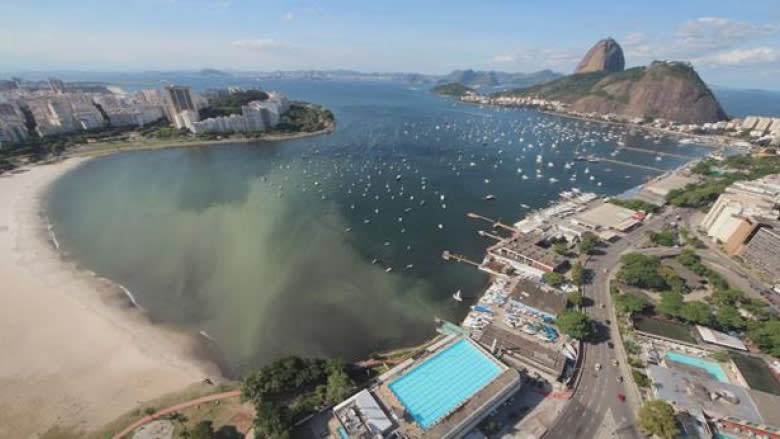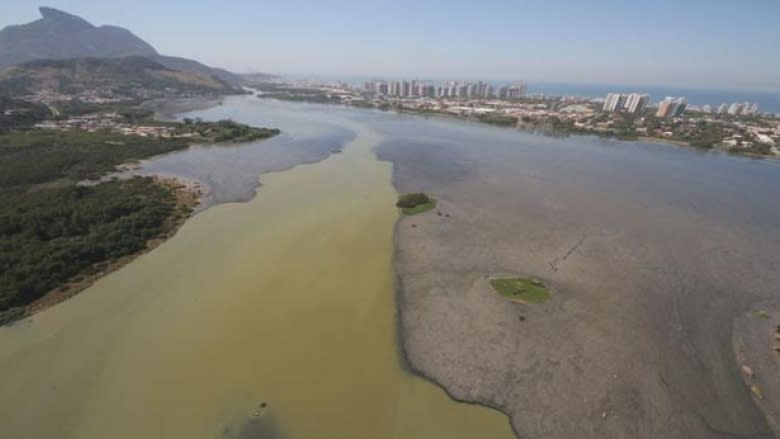Rio Olympics sailor Lee Parkhill says Toronto Harbour 'almost worse than what I see here'
The water conditions in Rio de Janeiro don't appear as bad as what's being reported, and the Toronto harbour is sometimes "almost worse," according to a Canadian Olympic sailor who is in the Brazilian city for his first Games.
"Most of the stuff in the media, I haven't actually seen it in person," Lee Parkhill told CBC News on Thursday.
Parkhill, of Oakville, Ont., has been training in the waters off Rio for eight weeks, preparing for the men's single-handed Laser dinghy competition.
- ANALYSIS | Up to athletes to redeem Olympic Games in Rio: Peter Mansbridge
Most of the "rubbish" only comes after big rainstorms, Parkhill says, and he has mostly seen empty water bottles floating around. He said the race courses in Rio look "like normal, like Toronto harbour," where he trained for four years as a teen.
"I've sailed a lot in Toronto harbour and after a big rainstorm, all the debris come from the Humber River," he said. "It's almost worse than what I see here."
Media report filthy waters
Many have expressed concern for athletes' safety, with reports of filthy water, ranging from sightings of animal carcasses to untreated sewage in the Rio waterways.
Parkhill, 27, said he has been training on all of the race courses, and often sees the boats sent to clean up garbage.
"In terms of water quality, you can tell that it's definitely not a perfect, crystal lake," he said. "But it's definitely getting better week after week."
A 16-month study commissioned by The Associated Press of water quality in Rio found athletes competing in the Games there risk becoming violently ill in water competitions. Human sewage contributes to waterways in Rio teeming with dangerous viruses and bacteria.
The AP's survey of aquatic venues part of the Olympic and Paralympic venues revealed consistent and dangerously high levels of viruses stemming from pollution, prompting biomedical expert Valerie Harwood to warn travellers: "Don't put your head under water."
Toronto has four wastewater treatment plants, removing solids, chemicals and other materials before water is released into Lake Ontario.
Brazilian biologist Mario Moscatelli showed CBC News the view from above in a helicopter.
"This is a shame!" Moscatelli said, pointing out the sewage flowing from streams and rivers into Rio's bays. "We have money, we have technology, but we don't have interest," he said.
Moscatelli has monitored the issue in Rio for the past 20 years and has been advocating a cleanup.
The city's poverty is a factor in the water contamination — hygiene and sanitation in the Rio's poorest neighbourhoods are substandard and people habitually throw their waste into the waterways. On radio and television, people are encouraged to stop throwing their garbage in the rivers.
Rio has treated only 17 per cent of its sewage in the past seven years. Games organizers had pledged to boost that figure to 80 per cent by the time the Olympics open, with governments at all levels spending a billion dollars to tackle the issue.
But of the eight planned treatment projects, only one was built.
CBC's David Common reported that the city is now treating 50 per cent of its sewage.
Parkhill said he doesn't know of anyone who has become sick.
When asked what he thinks about using disposable gloves or suits as a precaution, he chuckled. "[That's] rubbish. For me, no I wouldn't go that far at all," he said. "I wear the same suit every day and don't wash it in between days."
But Parkhill said he uses hand sanitizer before his meals between practice runs, and wears a jacket with a hood to avoid getting splashed too much.
"It's definitely a problem that's bigger than the Olympics and it'll be here when we're gone, but they're keeping it off our race courses for now."
Sailing ahead
Rio marks Parkhill's first time at the Olympics.
He won a bronze medal at the 2015 Pan Am Games and placed fourth in June's World Cup event in Weymouth, England. He finished in fifth place at the Rio 2016 test event and is ranked 11th in the world, according to the Olympics website.
His plan for the upcoming competition is to remain "level-headed" and "just plug away" at the 10 races he has over five days.
"It's pretty cool to make it to the pinnacle of the sport, and to the Olympics, and I tried to explain this to my supporters at the [yacht club in Oakville] and ended up breaking down in tears," he said.
Parkhill said he's excited to represent not only Canada, but also Oakville and the Greater Toronto Area.
"Hopefully my best will be good enough," he said.
The men's Laser one-man dinghy competition begins on Monday. Parkhill is scheduled to race at 11 a.m. ET.



